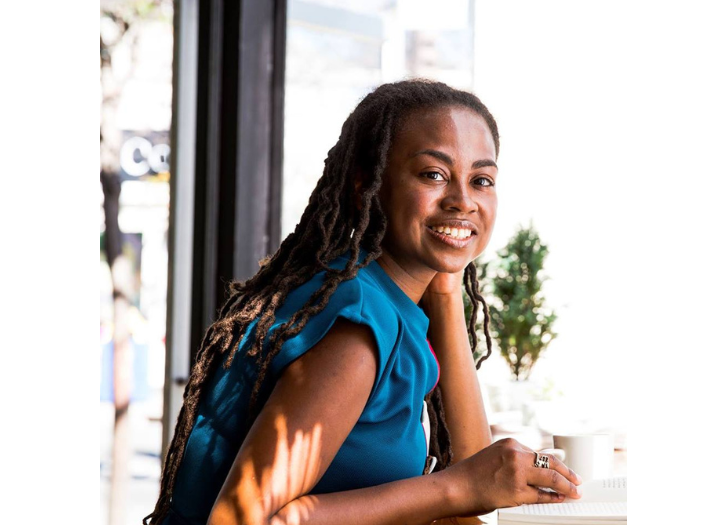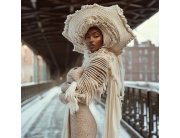March. What a beautiful time of the year where we celebrate Women’s History. I am truly excited and honored to share the interview held with Jamia Wilson. A South Carolina native who has traveled the world sharing not only her passion as a feminist activist, but her love for reading, writing and speaking. The questions and information acquired from our conversation was not only inspiring but motivational for those who hold a passion for others as she does. A woman who has faced many obstacles and grabbing the hand of others along the way showing them how they can overcome as well. I hope that you feel the love and energy as I had while speaking with this phenomenal woman.
When did you know that you would be a writer?
I always loved to write. I have early memories of being in kindergarten or preschool in South Carolina and starting to write my letters; starting to read and write little stories. I do remember always enjoying the experience of creative expression and being able to tell stories or leaving little notes and love notes and little stories and reading it to my family. My mom is such an avid reader and so was my dad that I was very much encouraged in that pursuit. When I wrote my first book for young children, Young Gifted and Black that Christmas, my mother handed me a copy of the first book I made when I was five which I had completely forgotten about. The stories, drawings, and writings were kept together with staples and ribbons.
It really moves me that my mom had a vision then that one day she would keep these things and show me that I had always known that writing would be an important part of my life. It was always something that I enjoyed doing. I had journals and diaries when I was really young as well and always wanted to kind of talk about my day and jot down notes. I think that over time continuing to have it be a part of my life and then seeing it as actual ways to share my story telling in bigger ways with each step has been interesting starting at home and then at church then camp and writing camp (school papers and camp papers) to later social media and then books has been a real blessing for me to be able to see that it’s always been in me. It’s just taking new forms over time as I sort of focused on the skills and my passion.
In This Book is Feminist, chapter three talks about how our parents feminist is not our feminist. You shared a memory with us of you and your mom disagreeing about you listening to Nirvanna and that she wanted you to stop listening to it; you stated the music taught you that when you truly come as you are we become who we are and she listened to you. What was it like to have this support growing up in your home?
My parents were professors and they were progressive also coming into a time where a lot was changing and young people were stepping up into activism. I also grew up with southern Christian black parents which has its own dynamic around authority and obedience and how children should behave and black children should also behave for their own safety because of all the systemic injustice that’s there. I was raised in a multigenerational family. Both of my grandmothers were in my life up until my forties. I even knew one of my great grandmothers. I think with that I had multiple elders in my life saying how they felt about whatever behavior I had at that time or whatever thing I was saying was a constant navigation of saying yes I respect my elders and ancestors and a part of my culture that I like.
We have a culture where we have a strong sense of honoring the people who came before us and the things they teach and we also, just as they did have the right and opportunity to pave our own paths discovering what works for us in the context of our time and how you reconcile that as a person and as a generation. As for me, as a child I was obeying my parents rules, I was respecting my parents but I was questioning and letting them know when I had an alternate point of view. In fact, in my book Stepping into your Power, I have a book of lessons and that book is for all children to experience. I do have guidelines on how to engage with adults who you disagree with respectfully, but also in a way in which you’re telling the truth about your own experience and how to ask questions. I have another book, Big Ideas for Young Thinkers that does this too. It’s about philosophy but it starts out with an intro where I say, were you or are you as a child accused of asking too many questions because why? was my favorite question as a kid. Whenever adults would just say because I told you so that was never good enough for me. I think the fundamental nature of that is that it actually helped lead me into my career because although this was a thing that constantly made me frustrated growing up in school and certain institutions where people just thought you were being defiant, when in fact I just didn’t understand the logic of why you came to see this this way when I see that or I don’t understand. Why do you feel threatened by me accessing this information because it’s just information? What is it charged on based on you that makes it dangerous to you? So my books actually invite young people to understand that if you are curious, have questions or are a critical thinker, you are not alone. I want those books to be there for those who might feel that they are isolated for whatever reason they can’t have those conversations with people in their life or to be read with people in their lives to help them facilitate those conversations or for parents who want their children to know they are there for those conversations. I recognize that not everyone has a perfect family; not everybody has a family that they feel safe in and I feel that that’s especially the reason I write books for young people because a book like that can be a lifeline or life boat because it’s so many people I know who grew up in less than ideal circumstances.
Some friends who grew up in foster care or unhoused situations like a refugee situation where books were the thing that helped transport them to another place or showed other possibilities other than the present. It showed me ideas other than the ones people had limited of me and my community. I feel really passionate young people should be supported in their pursuit of ideas and yes they should be taught to be people of conscious, to have empathy, to be respectful to people who’ve had more time on this earth who have important wisdom to share and to follow the lawful good.
Do you believe growing up in a feminist household made it easier to find yourself?
Yes. I think if I didn’t have the mom I had it would have been different. My mom was an amazing person and super encouraging, a caring, thoughtful and independent thinker. Having her not only as a teacher but as a role model was really important. She would be someone who I could say oh I witnessed this disparity in the family around gender. She did not feel like it was necessary to pretend something that could be righted was not wrong and I appreciate that because I saw that kind of thing growing up and it used to frustrate me when people would say there you go with your feminist stuff or you might be overshadowing another thing. Sometimes it would be male relatives who would say well you and your feminine stuff, it’s worse as black men. That would be things said and I would always question the idea of competition.
It was somehow my duty as a black woman to prioritize black men subjugation over my own. Why can’t we say it’s a bad situation for all of us as a collective and how are we working for our liberation together? I don’t free myself by prioritizing you over myself. Growing up in a feminist household helped but it also really helped having a black feminist mom. She didn’t have the patriarchy of male dominance over her. All of us have been conditioned by society to think that sometimes men in the family would call themselves feminist would still fall into those trappings of wanting to have the comforts of male privilege. She was really who I leaned on the most around that and the same with my grandmother on my mom’s side who had paved a lot of ground during her time; even going to college at that time was a big deal. I think that for me I was very much encouraged and being taught to think through things such as the conditions made us feel being on our own side was a sabotage or betrayal of our community. Who taught us that and what did they get out of it?
What advice would you give to younger women who have found their voice and power but struggle with imposter syndrome or may fear their gift?
The fear of the gift is an amazing question. Asking yourself what would be lost if you didn’t embrace your gifts? What would be lost to the world and to yourself if you didn’t honor your strength? I have a friend who is an amazing author and she once talked to me about the way in which she thinks about God and honoring wisdom from God and his light. She was talking about regarding yourself in a way you were created by God. Would you disfavor, discourage or undermine a creation of God in yourself or light? How could you undermine God by not tapping into the gifts you have? That was something that really moved me. When I would find myself wanting to shrink to make others feel more comfortable or being bullied for things that I thought were my strengths that other people didn’t get yet or found inconvenient or threatening which I experienced often in my life in many context in dimming my light so they can shine brighter or whatever it is she would say but that would be dimming Gods light that was given to you.
Even if someone doesn’t have a faith path there is still something in that message of what would be left to you and your spark and your one and only singular imprint on the world to lose out on the very special uniqueness of who you are? What would be left to you? What would be left to the world? I think that that’s important. I also think with younger women, which is why I write books like This Book is Feminist, a lot of times so many things people made me feel alone, less than, too much, extra as we say in our community about were things that have actually helped me build the life that I have that I enjoy and that I thrive in. It saddens me to think that had I done what they wanted for me to actually fit in, those main things of becoming a writer, a speaker, having a beautiful family of my own, all of that would not have happened if I’d done it the way they wanted me to. If I just listened and ate the poison of other peoples expectations I couldn’t do what I was sent here to do because they didn’t like it or they might not like it or they might have something to say about it. I just decided that and a part of it was seeing my mom pass and peoples behavior surrounding it really showed me life is too short to shrink.
I really want young women specifically but also young people, anybody who’s been told they are not enough or they can’t fit in or that they need other peoples permission to shine that that’s really not your problem, that’s their problem. Keep shining keep going and use things like books and writings and its great connective power of the internet and internet communities especially if you’re in communities where a lot of people may not share your beliefs and you’re living in a rural environment far away from people know that you are not alone; it may feel like you are in that present timeline, but there are others who agree with you and maybe even others who might need to hear your voice to be courageous about raising their own. That might also be the invitation to write and tell your story so that others might not feel alone to help find your own community.
In this Book is Feminist, you open up regarding the challenges you faced with your vision and how you later worked through this by taking control of the way it made you feel. What advice would you give to others who may struggle in this way?
Thank you for reading it so thoroughly. I would say really honor the feelings you have around a struggle. I don’t necessarily regret, but one thing I wish I had learned sooner I think some of it is social conditioning but there is no shame in completely honoring the disappointment, the pain, the struggle, the grief that comes with any hardship. There is no stigma about the truth of who you are; you don’t have to pretend that everything is positive. We can learn from the experiences that bring us to our knees too. Those can sometimes be really remarkable opportunities to think about. What is the thing that still inspires me? What is the thing that I’m still dreaming about? What is the thing that I want to get closer to even though right now I feel really down? When I was a kid I went to Amsterdam and I saw the Ann Frank house which is my favorite book.
One of the helpers who saved her and her family for two years, said within the years she helped in their life before they were tragically betrayed and murdered, accept her dad, said the youngest person in the world who may not feel they have a lot of positional power, still has the power to turn on the light in a dark room. I think about that a lot and that’s who I try to be. My mom was that; she was the one who if I was having a hard day and I’d say these bullies did this or that she’d say we are going to get through this. What do we have? How do we step into our power? What can you choose to do next? What can you decide to do next? What can we decide to do together? That is what I want to invite people to think about, the next step you can make, your next choice, how you can step into your own power. We often feel hopeless but we always have a choice we can make within the choice. It doesn’t mean there aren’t systemic injustices or real big rocks in front of the door, instead it just means we decide how we’re going to conduct the decision that we do get to make even in that space, how we show up and engage with them if we do.
These things are within our power. That’s what I invite folks to do and I really try to invite myself to do that every day. I will say it’s okay if some days are harder to do that than others; it’s a part of the dance. You can really congratulate yourself on the days it does feel easier. When I have those days that I’m in my power, in my agency and I’m feeling the energy I write it down to remind myself on the hard days I was able to get there. Today is just a day impacting the process, you’re going to get there again.
Instagram: Jamia Wilson
Facebook: Jamia Wilson
Photo Credits: Aubrie Pick







Happy Women’s Month 💕
Thank you Keva ❤️❤️.
The article was amazing great work, for both of these talented women,, Corial Cooper great work keep it coming. I am reading